Q&A Interview with Ben McKenzie & Regina King of SOUTHLAND
Maj Canton - December 17, 2010
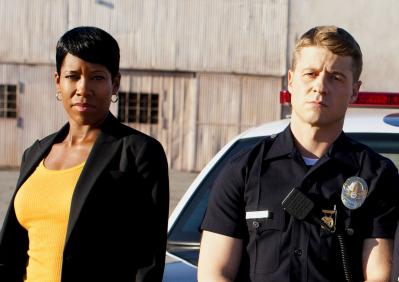
TV Tango recently had the chance to participate in a conference call with Ben McKenzie and Regina King of SOUTHLAND. They dished about the new season, Lydia's new partner, and life on the set. Plus, they talked about cop camp and ride-alongs. Season 3 premieres on Tuesday, January 4, 2011 at 10pm on TNT.
|
|
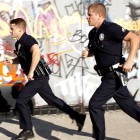 |
Question: During the past decade of TV, squad officers and detectives have taken a back seat while crime scene analysts and medical examiners -- and their techniques -- have taken over. But SOUTHLAND is one of those rare shows that confers that cops still are very interesting. Do you think SOUTHLAND is offering a unique point of view in that way? Ben McKenzie: I think that's a good point. I don't know if they simply think the technology has evolved enough to where they can make a show like CSI with all the sort of fancy graphics and camera angles interesting -- whether that's the reason for it or whether the template of the old shows about black and white and two guys and a police cruiser was getting stale. |
|
But whatever the reason, I think that SOUTHLAND is fairly unique because it's very much the antithesis of those kinds of shows that are more focused on the visual. This is really about an on-the-ground, boot-level view of policing a big, crazy city like Los Angeles in the 21st century and a grittier, rougher look at what it's actually like on a pretty human scale and how what the cops see affects them in their personal lives. I think that's the other thing that's missing CSI and LAW & ORDER. It's much more about the crime, solving the crime, and catching the bad guys at the end of the episode and being able to turn off their TVs and sleep soundly in their beds. And SOUTHLAND doesn't really do that ever. Often, we don't catch the bad guy if there is a bad guy. And even when we do, it's such a disturbing ride that you're not exactly sleeping quietly home at the end of the episode. It's a brutal look at the kind of rough world that the cops encounter; so I think it definitely has a place in society and I think it's not going to appeal to everyone. I don't think we'll ever get the kind of numbers that CSI or LAW & ORDER, get but it's not really the point. |
|
|
|
|
|
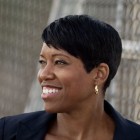 |
Question: Does playing a cop make you more vigilant, more cautious, more paranoid about putting yourself in dangerous situations in daily life? Regina King: Gosh, I don't think I'm paranoid, but I definitely would say that all of us are a little more aware of our surroundings and aware of things that are going on when you're not paying attention. We've learned in all of our boot camps and training with officers and detectives how they solve a lot of their cases, how they end up in situations where they've caught a criminal before an actual report was made. |
|
It's just because they have this ability -- that they were trained to acquire -- to check out body language and tones of your voice. And all those things help an officer determine, whether a person is guilty and just kind of speak to those gut feelings that you have as an officer.
And I wouldn't go as far as to say we've got this gut feeling that this lady in the car next to me is a criminal, but I would say that when I am in public situations I am more aware -- I don't know about you Ben. Like you can tell that somebody is high that you might not have paid attention to before we started this whole two-year journey on SOUTHLAND.
Ben McKenzie: I agree with that. I think you're more aware of your surroundings and a little more aware there's bad stuff out there. |
|
|
|
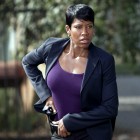 |
Question: You bring a lot of physicality to Detective Lydia Adams, chasing people down. So super fit. She's always trying to do the good thing, and she seems so perfect compared to the other characters. Are we going to see some chinks in that armor? Regina King: I think you're definitely going to see a less perfect side of Lydia, but I think what's interesting about how the writers are playing it -- you see a less perfect side as she discovers the less perfect side of herself. |
|
|
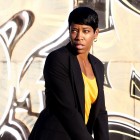 |
Question: What kind of training did you have to do to prepare for the role? Regina King: We all attend a boot camp, where most of the training was gun handling, handcuffing, and just the overall command presence that law enforcement has. What's been kind of like the added plus I think is that the studio got more bang for their buck -- they got an entire cast that is pretty frickin' fit.
We kind of make a joke: if we were in a competition against another show, we'd take anybody down. We've got a really, conscientious group of people. We're always on the set, looking at the treats. I'm going to walk away from that cupcake. Somebody pull me away. |
|
|
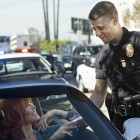 |
Question: This season are we going to continue to see Ben Sherman try to bury his privileged past or are we going to have it encroach on his police work? Ben McKenzie: You'll see his past but only in terms of what we've already shot, what I know. In Episode 3, the guy who rapes my mom gets out of prison and that affects me pretty severely and I go a little haywire because of it. But in general, no. In general we're not really going to dig. |
|
I think the producers made sort of a collective decision that what's most interesting -- the original intention of the show -- was to talk about cops on the job and have a little bit of their personal lives sprinkled throughout. To be very focused on the cops, what they see on the job, and how it affects them -- and only them -- in their personal lives, and not focus too much on sort of secondary, more atmospheric stuff. For my character -- like my sister who's getting married and my father who's a jerk and a high-profile defense attorney -- all this stuff is a little secondary to the specific focus of the show, which is cops and what they see on the job and how it affects them.
So I don't think we're going to get at too much of the Brentwood-cocktail party circuit. I thinking we're going to stick to boots on the ground and police work. |
|
|
|
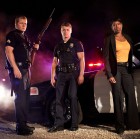 |
Question: Were both of you shocked by the fact that TNT picked up SOUTHLAND after NBC canceled it? Regina King: I felt that it was not the end. I always felt like there's just no way that all of these people -- and when I say all of these people, I mean the crew as well and the people behind the scenes that make this show a possibility -- to put this much work into something that turns out so great, and that it would just be over. I just don't feel like the universe works that way. I feel like the universe wants good to prevail. I kind of have a fairytale mind like that. |
|
Ben McKenzie: I don't know. Maybe I'm not as optimistic as Regina. At the end of the day, it was out of our hands. I wasn't thinking the worst, just that I have no effect on the outcome of this situation, which is the truth of the matter. And the truth of the matter is that none of us on the show did. John [Wells, the creator,] went around and shopped the show. TNT went out of their way to express interest in it and came up with the best offer. We're very grateful that they did. I think quite frankly it's due to TNT's interest and the interest of the fans who were pretty vocal who expressed themselves online and in letters and all over the place. That's why we're back. |
|
|
|
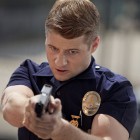 |
Question: You went to the cop camp, but have either of you gone out with actual cops and driven with them or spend any time with them on the street? Ben McKenzie: Yes, we did. It was really fun, and I've been to different parts of the city -- Newton division, which is a pretty rough area in South LA, then in the Valley and in West Hollywood, or West Latte as a lot of the cops like to call it since it's not particularly tough. Each ride-along was different, and each gave me a different perspective on what the cops do. And yes, I got something out of each of them. |
| Regina King: I got the chance, but mine was not as colorful as Ben's. Ben got the opportunity. I think everyone except for myself and Shawn [Hatosy] got a chance to see some interesting things. You heard Ben refer to West LA as West Latte and that's where Shawn and I went; so we got to see a more laid back, cleaned up side of the city. | |
|
|
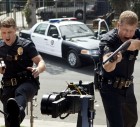 |
Question: So the subject matter of your show is obviously much, much heavier than a lot of network cop dramas these days. Does it ever get any easier for you when you open a script and you read the case that you're going to be exploring? Ben McKenzie: Sometimes it does, actually. Sometimes the thrust of each episode will almost always be the A-storyline; so it's almost always going to be pretty hard-hitting and kind of brutal. But there's often a B- and C-storyline that are much lighter and much funnier that's in there for comic relief. There's a lot of humor in what cops see and do. |
|
They are in such crazy situations all the time that some pretty bizarre, funny stuff happens. It sort of rotates amongst the cast who has those lines, but I think we've really found a lot of humor in the show. I think what's interesting about it, and I think this will be very evident in the episodes that will air on TNT this year that there's a lot of unexpected humor. A serious situation that has a really, really funny thing at the heart of it.
I think it's funnier than a lot of sitcom stuff out there because it's more honest and more disturbingly funny. I think walk a fine line on this show, a lot. |
|
|
|
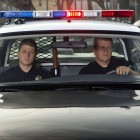 |
Question: In the Season 3 premiere, there's a great scene where you guys are coming up to Hollywood and Santa Monica. There's a shooting, and you put the bullet-proof vests over the windows of the car. Did you rehearse that with actual officers? Ben McKenzie: Right, that is a tactical maneuver that the LAPD does employ in certain situations. The body of the car is bullet-proof, but the windows can't be bullet-proof completely; so you throw the vests over the window when you're trying to pick up an officer who's down and trying to bullet-proof an entire side of the car that's taking oncoming fire. We have worked on that before. All of us collectively ran through an exercise. Was that first year, Regina? |
|
Regina King: God, I want to say it was second year, Ben.
Ben McKenzie: But we've done the thing together. |
|
|
|
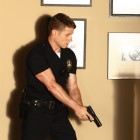 |
Question: So it's almost second nature now that you guys are comfortable? Ben McKenzie: Actually we haven't done it in a long time; so I was a little bit nervous about it but it actually. Even as complicated as you think it is to take off the shirts to get down to the vests, throwing the vests over the windows, and overlapping the vests so that there's no holes in it and shut the door. It's actually not as complicated as it may look. I don't know if it even looks that complicated but it's actually relatively straightforward. The trick is you're doing it while you're being fired upon; so you have the play the reality of that situation. |
| Regina King: I think there's a beauty in that particular scene that you're talking about. The fact that it shows this brotherhood that law enforcement has and the sacrifice that they're not only making for us civilians everyday, but even the extra mile that they'll go to put themselves in jeopardy for one of their one. |
|
|
|
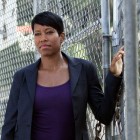 |
Question: Where do we pick up your characters and how do you feel about what time has passed since the last season? Regina King: When you come to this season, it is definitely clear that some time has passed, but not much. I have a feeling that only a few months have passed -- like six or seven months -- since the last time you've seen our heroes. In this season you are going to see how we are a little more flawed than what you might have thought in the prior seasons. |
|
|
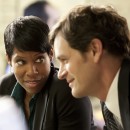 |
Question: What are some of those flaws you're enjoying exploring? Regina King: For Lydia specifically, that she may not be the easiest partner to work with -- contrary to her belief. You kind of see her discovering that through this new partner that she's working with. |
|
|
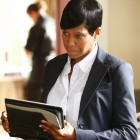 |
Question: Is there a pivotal case for Lydia this year? Regina King: Yes, there is. There's one that starts out seeming like it's going to be another murder case that she's picked up and turns out to go way beyond just being a murder case. |
|
|
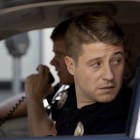 |
Question: Ben, what's up Officer Ben Sherman? Ben McKenzie: I'm running around with John and still in my last state of probationary period. The end of the season will mark the end of that period.
But for my character, it's kind of what Regina was saying that you're going to see both Lydia and Ben be more human than perhaps we've seen them before. Ben has an episode, like I said before, where the guy who raped his mom gets out of prison and he's finally forced to talk about it. I think it will shed some light on who this guy is deep down underneath a lot of the armor that he puts up. |
|
I think most of what you see is a pretty stoic guy out there, kind of just observing the world and taking John's flack -- taking a lot of grief from John -- but inside there's a lot of other stuff boiling underneath. You'll see that come to the surface in that episode. That should inform more of who this guy is. He's almost sort of obsessed with the notion of justice, and that's kind of what he's been pursuing his entire life. In that episode you see him kind of change and grow up and mature a little bit into a different kind of cop. |
|
|
|
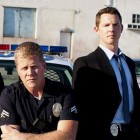 |
Question: What is it like working with the other cast members on the set? Is there a certain cast member that's the joker of the group? Regina King: [Michael] Cudlitz.
Ben McKenzie: Cudlitz is a joker. |
|
Regina King: Shawn [Hatosy] has kind of that sardonic-type wit.
Ben McKenzie: Yes, Shawn has a dark interior sense of humor. It's not a laughing joke.
Regina King: It's kind of like an hour later, "That was a joke, right?" Ben McKenzie: Right, right. Regina and I are just two bumps on a log taking it all in.
Regina King: Taking it all in, making them feel good about their jokes. Ben McKenzie: That's right, we play the audience. |
|
|
|
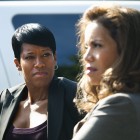 |
Question: Regina, can you tell us a little about Lydia's new partner this season and how the dynamics between them are going to work out? Regina King: Well, Lydia's never worked with a partner -- with a woman before -- and she is a woman who's been on the force longer than Lydia. She's a bit older than her; so there is that dynamic. It's not said, but the tension is felt when you have one person who is really good at their job and feels like "I've reached the level of success that I have because I've been this good." |
|
It's little similar to what goes on with John Cooper and Ben Sherman, but the only difference is Lydia's been around longer than Ben Sherman so she's a little more vocal about not liking the way her partner does her job. Ben Sherman definitely does not agree with all the stuff that he or John Cooper says, but it's his training officer so you kind of catch his disdain for some of the things that Cooper expresses in his looks where Lydia actually is more vocal. |
|
|
|
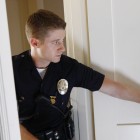 |
Question: Ben, what is your favorite thing about playing your character? Is there something specific that you like about him? Ben McKenzie: I think he chooses his words very carefully and he says less than he feels. I think that kind of reserved nature is powerful on camera. He's a pretty sharp guy. He takes in a lot. He's not glib. He doesn't speak his mind all that much, and he can't because of the nature of the dynamics between a training officer and a rookie cop. He has to bite his tongue a lot. |
|
But you'll see a lot of opportunities in this upcoming season for him to be funnier -- take that piss out of himself and John, kind of mess around a little bit. I think that's a good thing. If you spend 12 hours a day for a year in a patrol car with somebody else, you at some point get a little punchy and you just want to crack up a little and you want to just have some fun.
I think John and Ben felt that kind of comradery. They already laugh at certain situations that are absurd. As it goes along I find new angles to play and ways of playing scenes. I think there's always new ways to play those scenes because Ben's growing up and evolving and their relationship is changing. |
|
|
|
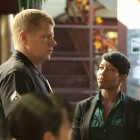 |
Question: Regina, what do you think some of the challenges are and what are some of the stereotypes that may persist about a woman working in a male-dominated profession? Regina King: A lot of those barriers and challenges that women on the force had to face has been overcome. There are more men on the force now that believe it’s necessary to have female and male officers -- that law enforcement is stronger with both because women have a certain sensibility that men don’t have and vice versa. That reality is shared with more officers now than even 15 years ago; so I think that that’s one of the things that’s kind of great about doing this type of show in this day and age because we are not dealing with all of those male versus female things, that’s kind of a story that, you know, we see that a lot in all industries and it’s not something that’s - I think it’s only been like even a C storyline for us, maybe even once. |
|
And when I say a C, more like a C-minus-storyline. It was just kind of touched upon, that one officer comes back with it still. He still has that idea that women should not be officers. But we don’t hit the nail on the head. It’s a better representation of how law enforcement is now. |
|
|
|
